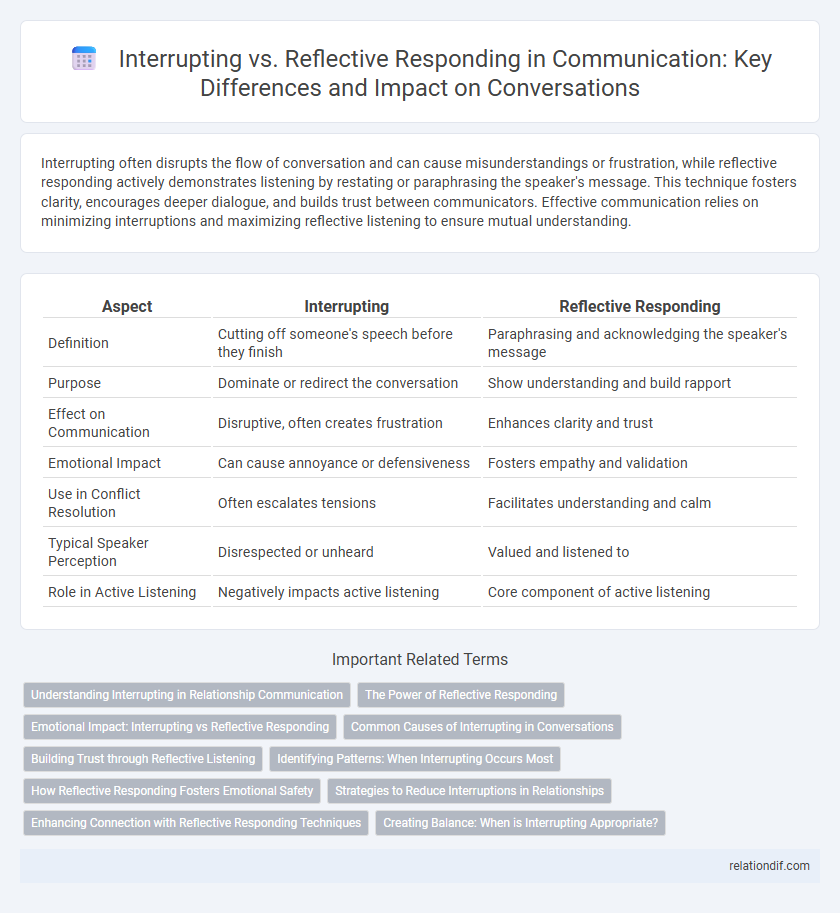Interrupting often disrupts the flow of conversation and can cause misunderstandings or frustration, while reflective responding actively demonstrates listening by restating or paraphrasing the speaker's message. This technique fosters clarity, encourages deeper dialogue, and builds trust between communicators. Effective communication relies on minimizing interruptions and maximizing reflective listening to ensure mutual understanding.
Table of Comparison
| Aspect | Interrupting | Reflective Responding |
|---|---|---|
| Definition | Cutting off someone's speech before they finish | Paraphrasing and acknowledging the speaker's message |
| Purpose | Dominate or redirect the conversation | Show understanding and build rapport |
| Effect on Communication | Disruptive, often creates frustration | Enhances clarity and trust |
| Emotional Impact | Can cause annoyance or defensiveness | Fosters empathy and validation |
| Use in Conflict Resolution | Often escalates tensions | Facilitates understanding and calm |
| Typical Speaker Perception | Disrespected or unheard | Valued and listened to |
| Role in Active Listening | Negatively impacts active listening | Core component of active listening |
Understanding Interrupting in Relationship Communication
Interrupting in relationship communication often disrupts the flow of understanding and can signal a lack of attentiveness or respect toward the speaker. Reflective responding, characterized by paraphrasing and validating the speaker's message, fosters deeper connection and builds trust between partners. Effective communication relies on minimizing interruptions and maximizing active listening to enhance emotional intimacy and mutual understanding.
The Power of Reflective Responding
Reflective responding enhances communication by actively listening and validating the speaker's emotions, fostering trust and deeper understanding. This approach reduces misunderstandings and minimizes conflicts compared to interrupting, which often disrupts the speaker's flow and may create frustration. Mastering reflective responding strengthens interpersonal relationships and promotes more effective, empathetic dialogues.
Emotional Impact: Interrupting vs Reflective Responding
Interrupting during a conversation often triggers feelings of frustration and emotional disconnection, undermining trust and openness between participants. Reflective responding, by accurately paraphrasing and validating the speaker's emotions, fosters empathy and strengthens relational bonds. This practice reduces misunderstandings and creates a supportive communication environment conducive to emotional healing and collaboration.
Common Causes of Interrupting in Conversations
Interrupting during conversations often stems from impatience, a desire to control the discussion, or the need to express strong emotions quickly. People may also interrupt when they misunderstand the speaker's intent or feel anxious about forgetting their point. Reflective responding, in contrast, encourages active listening and empathy, reducing the urge to interrupt and fostering clearer, more respectful communication.
Building Trust through Reflective Listening
Reflective listening enhances communication by demonstrating genuine understanding, which fosters trust between parties. Pausing before responding allows for accurate interpretation and validation of the speaker's feelings and thoughts. This approach reduces misunderstandings and encourages openness, creating a foundation for stronger, more trustworthy relationships.
Identifying Patterns: When Interrupting Occurs Most
Interrupting frequently occurs during high-stress conversations, rapid exchanges, and moments of emotional intensity, disrupting the flow of communication. Reflective responding, by contrast, involves actively listening and identifying underlying themes or feelings before replying. Recognizing these patterns allows individuals to cultivate patience and enhance mutual understanding in dialogues.
How Reflective Responding Fosters Emotional Safety
Reflective responding fosters emotional safety by validating the speaker's feelings and demonstrating genuine understanding, which diffuses tension and promotes trust. This communication technique encourages open dialogue by allowing individuals to feel heard and respected, reducing the likelihood of defensive interruptions. As a result, reflective responding builds stronger interpersonal connections and supports a supportive emotional environment.
Strategies to Reduce Interruptions in Relationships
Effective communication in relationships depends on minimizing interruptions to foster understanding and trust. Implementing active listening, such as pausing before responding and acknowledging the speaker's points, encourages reflective responding and deeper connection. Setting clear conversation rules and practicing mindfulness can significantly reduce interruptions, enhancing emotional intimacy and mutual respect.
Enhancing Connection with Reflective Responding Techniques
Reflective responding techniques deepen communication by validating emotions and clarifying messages, fostering trust and empathy between individuals. Unlike interrupting, which can disrupt conversation flow and provoke defensiveness, reflective responding encourages active listening and thoughtful engagement. This approach enhances connection by promoting mutual understanding and reducing conflicts in personal and professional interactions.
Creating Balance: When is Interrupting Appropriate?
Interrupting can be appropriate in conversations requiring urgent clarification or immediate feedback, ensuring the dialogue stays focused and efficient. Reflective responding fosters understanding by allowing speakers to feel heard and validated, promoting deeper connection. Balancing these techniques enhances communication by blending timely interventions with empathetic listening.
interrupting vs reflective responding Infographic

 relationdif.com
relationdif.com